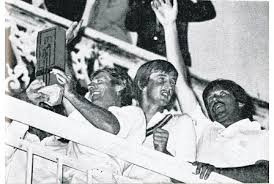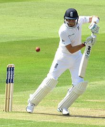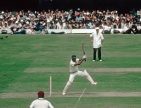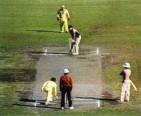Derbyshire’s Day In The Sun
Gareth Bland |
Coming from, and supporting, an unfashionable county, one not given to huge successes, means that when the big days come round they are savoured with a relish that those raised on a constant diet of silverware can scarcely imagine. Derbyshire is a club with a heritage, for sure. We have a tradition of pace and seam bowling that has occasionally helped nourish the national side over the years. That tradition has included such servants to the county as Arnold Warren, Bill Copson, John Paxton, William Mycroft, Harold Rhodes, Cliff Gladwin, Les Jackson, Alan Ward, Mike Hendrick and Devon Malcolm. Even the Danish seamer Ole Mortensen found a home in the county and became “The Great Dane” to us long before Peter Schmeichel appeared on the scene at Old Trafford and acquired the tag.
This lineage makes Derbyshire county cricket’s West Ham Utd: a club with a flair for producing a certain kind of player without the bulging trophy cabinet to reflect the talent produced. The East End club’s “Academy” reflects a technical tradition and set of values that sees a kind of parallel in the Midland county’s previously inexhaustible supply of pace and seam exponents. Like the Hammers, though, Derbyshire’s trophy polishers have not been overextended throughout the course of the club’s history. A county championship in 1936, a Division Two title in 2012, a Sunday League title in 1990 and the Benson and Hedges Cup in 1993 stand with the inaugural Nat West Trophy win in 1981 as the reward for Derbyshire’s endeavours. It is the latter, which took place on 5th September 1981, that stands out as being the most dramatic event in the county’s history.
In order for Derbyshire to reach the Lord’s showpiece they first beat Essex in a semi-final which, for the sheer drama of its finish, was almost the equal of the final itself. With the 5th Test at Old Trafford finishing the day before, the semi-final was slotted into the domestic schedule for the 18th August. Barry Wood, the Yorkshireman who had arrived in Derby via thirteen years as a Lancashire player, won the toss and sent Keith Fletcher’s men into bat.
Gooch’s poor Test match form followed him to Derby and he soon joined his opening partner, Brian Hardie, back to the pavillion after edging a Paul Newman outswinger to Bob Taylor for 14. With Mike Hendrick mean and miserly as ever on a green surface, and with Colin Tunnicliffe gaining awkward bounce, Essex were 98/8 before Norbert Phillip and David East added 46. A final total of 149 from the full 60 overs, though negligible on paper, was bound to present problems for the home side. Where Derbyshire had Tunnicliffe, Hendrick and Newman, Essex could boast a seam attack of John Lever, Derek Pringle, the experienced Stuart Turner and the West Indian all-rounder Phillip.
Four interruptions for bad weather on the day meant that the tie was scheduled to restart the following morning. With Derbyshire resuming from their overnight 13/2, each of the Essex seamers was on his game as the home side were reduced to 75/4 and then 133/8. The Derbyshire twin towers of John Wright and Peter Kirsten both failed and Geoff Miller was sent back for a duck as only the young man from Leek, Kim Barnett, then only 21, surmounted the conditions to strike 59. The man later dubbed “Kim No-Barnett” by Phil Tufnell, in a nod toward Cockney rhyming slang and his shining pate, made his mark here and received the man of the match award from Nottinghamshire legend Reg Simpson. It was, however, the old stager, Bob Taylor, in his benefit year at the age of 40, that was there at the end with the young England hopeful Paul Newman. Needing two for victory, and with the last delivery bowled, Norbert Phillip inexplicably missed the stumps from close range as Newman scampered for the single. Derbyshire were home and dry, though, as they had reached the final by virtue of having lost fewer wickets.
Derbyshire’s opponents at Lord’s were Northamptonshire, themselves reaching the final thanks to a semi-final victory which was scarcely less dramatic. Chasing Lancashire’s 186 at Northampton they eventually got home by one wicket off the penultimate ball of the final over. As he had done in the semi-final Barry Wood elected to field on winning the toss. This time the seamers made no early inroads as Geoff Cook and Wayne Larkins began confidently with a stand of 99. Allan Lamb, Peter Willey and Tim Yardley were then all run out cheaply as the middle order lost its way. Geoff Cook finished with a fine captain’s hundred, though, and Northants closed on 235/9 after earlier promising more.
When Alan “Bud” Hill was dismissed with the score on 41 the Derbyshire reply did not stutter. Those two class acts, Wright and Kirsten, each fired to take their side to 164/1. It was then that Neil Mallender trapped both of them leg before just one run apart and the innings lost momentum. Wood, Barnett and David Steele each tried to up the ante without success and eventually Geoff Miller was joined by the left-arm seamer Colin Tunnicliffe. By an amazing quirk of fate it came down to the last ball yet again. A single would clinch the trophy for Derbyshire as they had lost three fewer wickets. In a frantic struggle Tunnicliffe made it home in the gloaming so that his team won in exactly the same fashion as they had in the semi-final.
For his captain’s innings of 111 Geoff Cook was awarded the man of the match award by adjudicator Viv Richards. The big prize, though, was lifted by Barry Wood on the Lord’s balcony. For the diminutive wicket-keeper, Bob Taylor, it had proved quite some benefit year. The greying elder statesman,“Chat” could be justly proud of his winners medal here, achieved in dramatic last gasp fashion. It was a well earned reward to go alongside that other memento he had salvaged earlier in the summer: the match ball he had snaffled following his team’s victory in a certain Test match up at Leeds.





Leave a comment